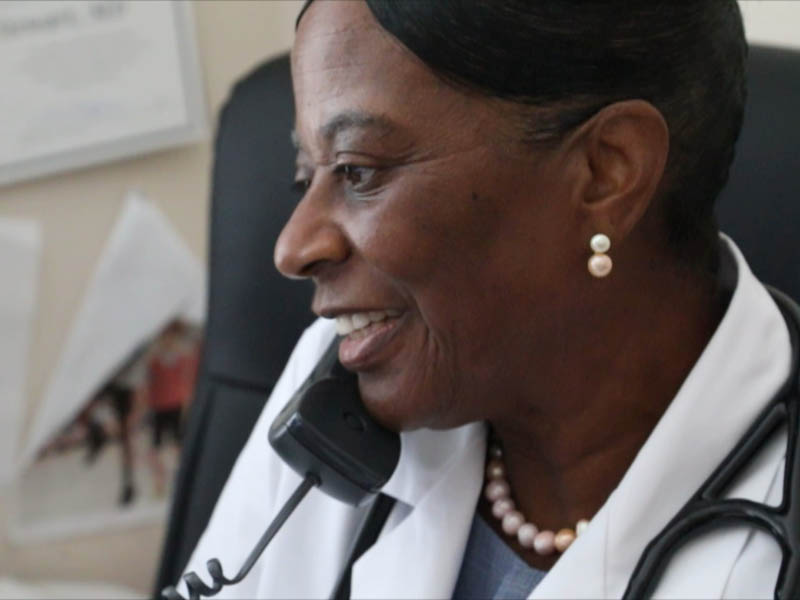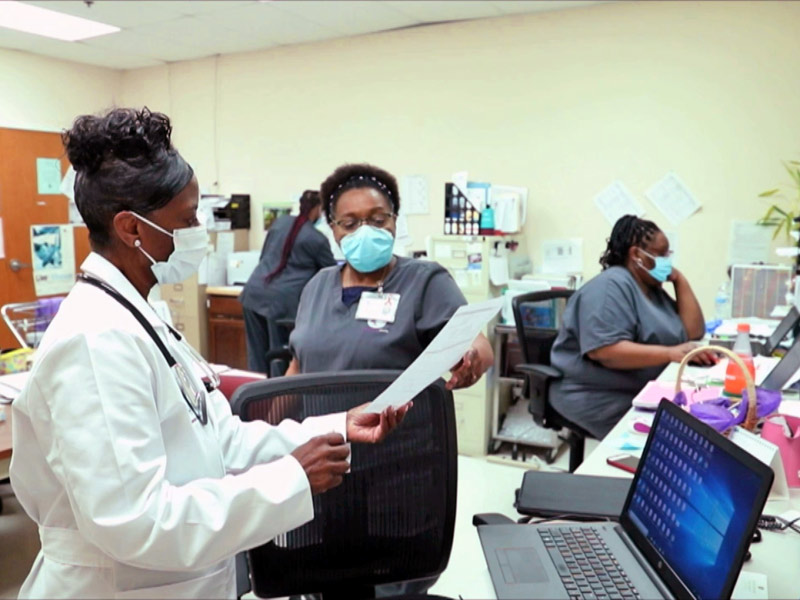Q&A With Ada Stewart, M.D.
New AAFP President Heeded Call to Serve
October 13, 2020, 8:05 pm David Mitchell -- Ada Stewart, M.D., was installed as AAFP president Oct. 13 during the Academy’s virtual Congress of Delegates. Although the title is new to Stewart, leadership is not.

Stewart chaired AAFP committees and commissions and served as president of the South Carolina AFP before serving three years as an AAFP director and the past year as president-elect. Her progression in family medicine leadership coincided with her rise to the rank of colonel in the U.S. Army Reserve.
AAFP News recently talked with Stewart about her career path and leadership development, the need for equity in leadership roles and the challenges facing family medicine.
Q: When you were named AAFP president-elect last fall, you told the Congress of Delegates, “This is historic.” What does it mean to you to be installed as the first Black woman, third Black person and fourth woman to be AAFP president, especially at a time when issues related to race and equity are being raised nationally?
A: Representation matters, and we are now living through a historical shift in how our society views its legacy of underrepresentation of minorities and women in leadership roles. My personality is not to make a huge deal of being a woman and being African American. It is who I am. But the historical significance of my election really hits home when I hear people tell me how happy they are to see an African American woman in leadership.
Much is made of the importance for young people to see people who look like them serving in important roles in society. But representation matters to everyone — even to adults. I remember how proud I was last year when Dr. Patrice Harris was elected as the first African American woman president of the AMA. When we see ourselves in others — when we can aspire to standing in their shoes — it gives us hope that society can be more open, more diverse and more inclusive. I hope I can inspire others to not only become physicians, but to also become leaders in their communities, especially in times such as these when the issues of racial injustice are foremost in our minds.
It deeply humbles me to consider that I stand on the shoulders of the women who came before me. As the late Justice Ruth Bader Ginsburg said, “Women belong in all places where decisions are made. It should not be that women are the exception.”
I must note that I am also proud to follow in the footsteps of another person of color, AAFP Board Chair Gary LeRoy, M.D.
Q: You lost your mom to breast cancer and your dad to heart disease – both diseases that affect Black people disproportionately. How did that affect your career path then and how does it help shape your view of health equity?
A: Losing my mom and dad to preventable health conditions compelled me to become a family physician. I was drawn to the specialty because of its emphasis on prevention, treatment and care for the whole person. I saw first-hand the result of health inequity as I watched my mom, with a late diagnosis of breast cancer, die within months. I wanted to prevent another family from suffering the same devasting loss. That is why I dedicated my life to serving communities that are underserved and underprivileged.
Q: You originally studied to be a pharmacist. What made you go back to school to become a doctor? Why family medicine?
A: My dedication to the specialty of family medicine began while I worked as a community pharmacist. As a pharmacist, I provided support, friendship, preventive education, emotional and spiritual support to patients. The preventable deaths of both my parents motivated me to want to do more. While reading the local newspaper one day, I read about a local family physician who spoke of her role in providing health education, preventive medicine, care of the entire family and treatment of the whole person. I immediately realized that those were the roles I wanted to fulfill. Subsequently, I began my quest to apply to medical school and then specialize in family medicine.

Q: After 9/11, you joined the U.S. Army Reserve. Why was that an important step for you, and how did it help shape you as a leader?
A: Throughout my life, I have been committed to service. Not only do I serve my God, my family, my patients and my community, but also my country. After the events of 9/11, I felt compelled to do something to help.
I decided to join the Army Reserve. That opportunity helped me to grow and become a leader in the military, which builds strength, courage, character and organizational skills – qualities that helped me to be the leader that I am today.
Q: What led you to decide that you wanted to become president of the AAFP, and what particular strengths do you believe you are able to bring to your new role?
A: My journey in organized medicine has led me to this place and time. The trust the members have placed in me by electing me to this esteemed office invigorates me. I am an active listener who will listen to our members’ needs and concerns. I am dependable and will tackle each of the challenges that lie ahead. I will continue to promote the integrity of the medical profession and our specialty. I will be a strong and staunch advocate for our members and our patients. I am committed to promoting and supporting family medicine as the foundation of an efficient, effective and high-quality health care system that our country deserves. It is these qualities that I will bring to my new role as AAFP president.
Q: What do you see as the biggest issues facing family medicine?
A: The biggest issues facing family physicians are payment reform and administrative complexity. We saw the impact that the COVID-19 pandemic had on practices based on our fee-for-service system. We now must fight for value-based payment reform. In addition, we must continue to address administrative complexities. This has been burdensome on many physicians, including myself. We must continue to create our future embracing technology and using it as a means to decrease administrative burdens. Our Academy must continue to be on the front lines as we address these issues.
Q: You precept medical students and residents. What do you try to show them and teach them about family medicine?
A: When I precept medical students and residents, I want them to see that I love being a family physician. I want them to see how I relate to patients, how each day is never the same, and how exciting it is to be a family physician. They also see how some days are stressful, while other days are more laid back. They see challenges some patients experience, whether it is not having money for their prescriptions or not being able to get to the referral that I have ordered for them. Bottom line, however, it’s all about relationships. My relationships with my patients make every day worth getting up in the morning. Taking care of my patients makes me happy. It is also what makes me want to advocate on their behalf and for our specialty. No other specialty does what we do. At the end of their rotation with me, I trust they will see and feel that family medicine is the best specialty ever.
Q: You’ve spent a large part of your career focused on HIV care. Why is that patient population particularly important you? What drew you to that?
A: I feel that my purpose in life is to be a compassionate, helpful contributor to the world. The best way to affirm that is to be a caregiver, a promoter of health, a healer, a friend and a professional guide for those on their road to overall wellness. That is also why I am a family physician. I have found that people living with HIV face a stigma and discrimination in receiving health care. I felt compelled to provide care for this population, and I have learned first-hand the challenges they face. I chose to become a voice for them and an advocate for individuals living with HIV. I am honored to care for my patients with HIV. I am also keenly aware of how people of color are disproportionately impacted by HIV, which strengthens my commitment to addressing health equity for everyone.
Q: Looking back at your history with the AAFP, it’s clear you’ve made a point of being involved – as a new physician delegate to the Congress of Delegates, convener of the (then) National Conference of Special Constituencies, president of the South Carolina chapter, and commission and committee chair. Why has that been so important to you? What would you say to members who are on the fence about getting involved outside their clinics?
A: It is important that physicians get involved in their communities because we are looked upon as leaders. Therefore, we have an important platform that we can use to speak up for your patients and further serve your community. As President Barack Obama once said, “One voice can change a room. And if one voice can change a room, then it can change a city. And if it can change a city, it can change a state. And if it can change a state, it can change a nation. And if it can change a nation, it can change the world.”
If one voice can change the world, then the collective voices of family physicians across this country can change the health care for our nation. We need your voice.